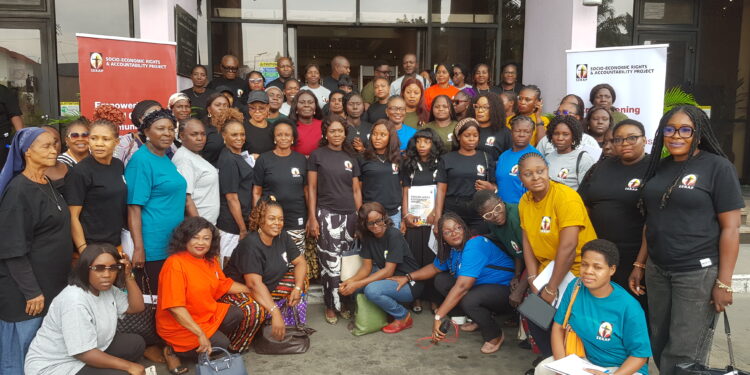The Socio-Economic Rights and Accountability Project, SERAP, has trained Niger Delta women on how to prepare for public interest litigation and navigate its challenges.

The training which was held in Port Harcourt, the Rivers state capital, on Tuesday, provided a step-by- step guide for women in oil-producing communities on how to lay the groundwork for a compelling legal case, one that not only meets the standards of the court but also galvanizes public support and brings attention to the injustice being challenged.
Laeticia Uju, Esq, the resource person, explained that the steps in preparing for public interest litigation include; identifying the core problem as well as the central harm or injustice the problem has caused? Who is responsible? Who is affected? Is it a one-time incident or part of a broader pattern? Is there existing evidence or documentation?
Also, gathering strong and reliable evidence such as visual, testimonial, scientific, economic and documentary evidences, and medical reports confirming healrh issues such as skin rashes, miscarriages, cancer and respiratory problems.
In addition, preserving and protecting evidence, mapping the legal violations, finding legal support and partnering with lawyers and civil society groups, experts, and using the Freedom of Information (FOI) ACT to get the facts.
On how to make an FOI request, Uju said, “An application may be made in writing, addressed to the head of the relevant organization, institution or government agency such as the Federal Ministry of Environment, Nigerian Natuinal Petroleum Company Limited ( NNPCL), the Niger Delta Development Commission(NDDC), the National Oil Spill Detection and Response Agency ( NOSDRA), State and National Assembly etc, or submitted orally in person.
” When it is made oral, the authorized official to whom an oral application for information or record is.made to, shall reduce the oral application made into writing and give a copy to the applicant.
“When drafting a formal request letter, ensure it clearly states the specific information or document you are requesting. Include your full name, address, phone number and.email(if available). Be as.specific as.possible and.use clear and simple language. You can submit your request through hand delivery to the institution’s office ( get an acknowledgement copy stamped), via email, or postal service( keep proof of postage and delivery). Address it to the Head of the institution.and wait for a response within 7 days.
” By law, the institution.must respond within 7 days.of receiving your request. If the institution refuses to release the information without lawful justification, or fails to.respond at all, you have the right to sue under the FOI Act.
“The court can compel the release of the requested information and penalize the responsible officials.
“You don’t need a lawyer to write a request.
“You can request a sample FOl request template from SERAP or other civil society organizations, NGOs, or legal aid group.
” If your request is denied , delayed beyond 7 days, or ignored, you have the right to challenge and review the denial in court under the FOI Act.
” When denied, you can file a public interest lawsuit in the Federal High Court or State High Court, as applicable, demanding the release of the requested information. The court may order the institution to release the documents or data, declare the refusal as illegal or unconstitutional and impose a fine of N500,000 on the responsible officer for wrongful denial as appropriate and as claimed in your lawsuit.
” You can contact organizations such as Socio-Economic Rights and Accountability Project (SERAP) that specializes in freedom of information and public interest litigation for guidance and support. These groups often offer free legal support”.
Speaking further, she highlighted the risk that comes with demanding justice through public interest litigation and the need for women activists to prioritize their safety.
She said that in regions where oil exploration and profit interests dominate, women who speak out may face threats, isolation, or retaliation.
She stressed that women should safeguard themselves, build a protective community and remain resilient in the face of challenges.
” Women involved in legal action against powerful actors whether government or oil companies may encounter personal, social and economic dangers. These include; threats or intimidation community backlash, harassment by authorities, loss of income or shelter and emotional and psychological toll” she said.
While wrapping up the training, SERAP’s Legal Adviser, Valentina Adegoke, implored the participants to teach other women in their communities what they have learned.
” it is important that you educate the women in your different communities to speak up, demand accountability, stand firm, identify when there is social injustice and fight against it”, she said.
She disclosed that SERAP woiuld create a WhatsApp group with the name ” The Niger Delta Women Network for Social Justice in Nigeria”, which will have all participants as members of the group.
She added that the body would appoint a contact person within its team that people could easily reach out to when they are having issues or not getting fast response on the WhatsApp group. Also, who they could easily reach to table their complaints and get legal advise and the next step to take in the event of breach.
Adegoke emphasized the importance of women being aware of the activities that are going on in their communities at all times.
“We encourage your direct participation in monitoring, reporting and engaging in legal processes.
” it will be good if you report the activities to us, send us evidences, pictures and when your cases are being filed, you will be a part of it”.
The SERAP Legal Adviser called for collaboration between the participants and SERAP in the fight againat injustices to women in Niger Delta.
” We implore you to strengthen sustainable partnership. Our relationship should not end in this hall. If there is a breach, you want to co-write FOI; NOSDRA is not answering you; you have gathered enough evidence; the courts are stressing you out; our lines are always open, feel free to reach us, we are available to pursue the case with you, no matter the stage you have gotten to in that case, we will take it up”, she promised.
While thanking all participants for honouring SERAP’s invitation, Adegoke said, “Let us be inspired to act, stand, speak and use PIL as a tool for accountability, fairness and justice in our communities”.
The training was attended by women leaders, female traditional rulers, women activists, women’s groups, market women leaders, and other women stakeholders from the Niger Delta and oil-producing communities.



















